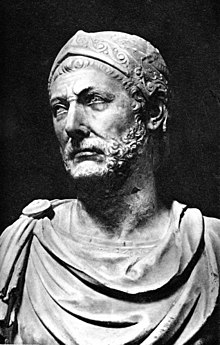Hannibal Barca (Punic language: 𐤇𐤍𐤁𐤏𐤋 𐤁𐤓𐤒 ḥnb‘l brq; 247 – between 183 and 181 BC),[n 1] was a Carthaginian general, considered one of the greatest military commanders in history. His father Hamilcar Barca was the leading Carthaginian commander during the First Punic War. His younger brothers were Mago and Hasdrubal, and he was brother-in-law to Hasdrubal the Fair.
Hannibal lived during a period of great tension in the western Mediterranean Basin, when the Roman Republic established its supremacy over other great powers such as ancient Carthage, the Etruscans, Samnites and the Greek kingdom of Syracuse. One of his most famous achievements was at the outbreak of the Second Punic War, when he marched an army which included war elephants from Iberia over the Pyrenees and the Alps into Italy. In his first few years in Italy, he won three dramatic victories—the Trebia, Lake Trasimene, and Cannae, in which he distinguished himself for his ability to determine his and his opponent's respective strengths and weaknesses, and to plan the battle accordingly—and won over many allies of Rome. Hannibal occupied much of Italy for 15 years but was unable to march on Rome. An enemy counter-invasion of North Africa forced him to return to Carthage, where he was decisively defeated by Scipio Africanus at the Battle of Zama. Scipio had studied Hannibal's tactics and brilliantly devised some of his own, and finally defeated Rome's nemesis at Zama, having previously driven Hannibal's brother Hasdrubal out of the Iberian Peninsula.
After the war, Hannibal successfully ran for the office of sufet. He enacted political and financial reforms to enable the payment of the war indemnity imposed by Rome; however, Hannibal's reforms were unpopular with members of the Carthaginian aristocracy and in Rome, and he fled into voluntary exile. During this time, he lived at the Seleucid court, where he acted as military advisor to Antiochus III the Great in his war against Rome. Antiochus met defeat at the Battle of Magnesia and was forced to accept Rome's terms, and Hannibal fled again, making a stop in the Kingdom of Armenia. His flight ended in the court of Bithynia, where he achieved an outstanding naval victory against a fleet from Pergamon. He was afterwards betrayed to the Romans and committed suicide by poisoning himself.
Hannibal is often regarded as one of the greatest military strategists in history and one of the greatest generals of Mediterranean antiquity, together with Philip of Macedon, Alexander the Great, Julius Caesar, and Scipio Africanus. Plutarch states that Hannibal was questioned by Scipio as to who was the greatest general, and Hannibal replied either Alexander or Pyrrhus, then himself, or, according to another version of the event, Pyrrhus, Scipio, then himself. Military historian Theodore Ayrault Dodge called Hannibal the "father of strategy", because his greatest enemy, Rome, came to adopt elements of his military tactics in its own strategic arsenal. This praise has earned him a strong reputation in the modern world, and he was regarded as a great strategist by Napoleon and others.
Hannibal lived during a period of great tension in the western Mediterranean Basin, when the Roman Republic established its supremacy over other great powers such as ancient Carthage, the Etruscans, Samnites and the Greek kingdom of Syracuse. One of his most famous achievements was at the outbreak of the Second Punic War, when he marched an army which included war elephants from Iberia over the Pyrenees and the Alps into Italy. In his first few years in Italy, he won three dramatic victories—the Trebia, Lake Trasimene, and Cannae, in which he distinguished himself for his ability to determine his and his opponent's respective strengths and weaknesses, and to plan the battle accordingly—and won over many allies of Rome. Hannibal occupied much of Italy for 15 years but was unable to march on Rome. An enemy counter-invasion of North Africa forced him to return to Carthage, where he was decisively defeated by Scipio Africanus at the Battle of Zama. Scipio had studied Hannibal's tactics and brilliantly devised some of his own, and finally defeated Rome's nemesis at Zama, having previously driven Hannibal's brother Hasdrubal out of the Iberian Peninsula.
After the war, Hannibal successfully ran for the office of sufet. He enacted political and financial reforms to enable the payment of the war indemnity imposed by Rome; however, Hannibal's reforms were unpopular with members of the Carthaginian aristocracy and in Rome, and he fled into voluntary exile. During this time, he lived at the Seleucid court, where he acted as military advisor to Antiochus III the Great in his war against Rome. Antiochus met defeat at the Battle of Magnesia and was forced to accept Rome's terms, and Hannibal fled again, making a stop in the Kingdom of Armenia. His flight ended in the court of Bithynia, where he achieved an outstanding naval victory against a fleet from Pergamon. He was afterwards betrayed to the Romans and committed suicide by poisoning himself.
Hannibal is often regarded as one of the greatest military strategists in history and one of the greatest generals of Mediterranean antiquity, together with Philip of Macedon, Alexander the Great, Julius Caesar, and Scipio Africanus. Plutarch states that Hannibal was questioned by Scipio as to who was the greatest general, and Hannibal replied either Alexander or Pyrrhus, then himself, or, according to another version of the event, Pyrrhus, Scipio, then himself. Military historian Theodore Ayrault Dodge called Hannibal the "father of strategy", because his greatest enemy, Rome, came to adopt elements of his military tactics in its own strategic arsenal. This praise has earned him a strong reputation in the modern world, and he was regarded as a great strategist by Napoleon and others.

Комментарии
Отправить комментарий